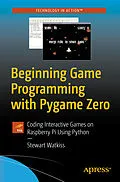Make fun games while learning to code. Focused on making games rather than teaching programming theory, in this book you're more likely to see code on how gravity affects a missiles trajectory instead of the most efficient way to search through data. Even then the code is kept simple as games should be about playability rather than complex physics. There are links to the official documentation when you need to lookup information that isn't included in the book.
Start with a simple text based game to grasp the basics of programming in Python. Then moves on to creating simple graphical games in Pygame Zero. Not only will you learn object oriented programming to make it easier to make more complex games, you'll also work to create your own graphics and sounds. 3D graphics are a little complex. So we focus on 2D games, including spins on some classic boardgames and arcade games. All the games are designed to run on a Raspberry Pi. They will work on any Raspberry Pi, butwill also work on any other computer that supports Python 3 along with Pygame Zero.
The games you make will be playable and hopefully fun to play. And by the end of the book, you can step beyond the provided source code to develop your own unique games and programs.
You will:
- Code in Python
- Generate sounds and graphics for 2D games
- Grasp object oriented programming with Pygame Zero
Autorentext
Stewart Watkiss is a keen maker, programmer, and author of Learn Electronics with Raspberry Pi. He studied at the University of Hull, where he earned a master's degree in electronic engineering and more recently with Georgia Institute of Technlogy where he earned a master's degree in computer science.
Stewart also volunteers as a STEM Ambassador, helping teach programming and physical computer to school children and at Raspberry Pi events. He has created a number of resources using Pygame Zero which he makes available on his web site (www.penguintutor.com).
Inhalt
Chapter 01 - Game Programming, Introduction to Concepts and Python / Pygame Zero Chapter 02 - Getting Started with Python
* Text based joke
* Text based quiz
Chapter 03 - Pygame Zero
* Compass Game
Chapter 04 - Changing Game Play
(Expands on the basic game in the previous chapter to make it more entertaining)
* Compass Game (improved)
Chapter 05 - Calculating Trajectory and Creating Dynamic Worlds
* Tank wars
Chapter 06 - Sound Effects
* Sounds
* Music
* Audacity
* SonicPi
Chapter 07 - Designing Your Own Graphics (Sprites)
* Draw
* Gimp
* Blender
Chapter 08 - Object Oriented Programming and Using a Mouse
* Memory game
Chapter 09 - Color and Customizing Graphics
* Adding color (look at color through bouncing balls)
* Customize Graphics (based on svg to png conversion) - used in compass game
Chapter 10 - Adding Artificial Intelligence
* Possibly improving on previous games
